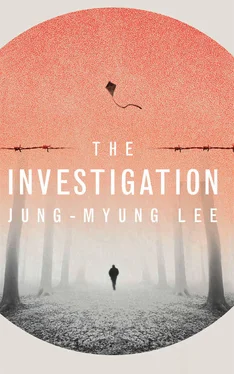‘It makes me wonder which singer would be able to hold his own.’
‘Professor Marui Yasujiro. He’s the foremost tenor in Japan. He teaches at Tokyo Imperial University Music School and has made several records. He’s renowned worldwide, especially for performing Schubert. To really express the loneliness and gloom of this piece, he sang it as a baritone. His performances are some of the best interpretations of Schubert’s work.’
I was sufficiently awed, and it must have shown on my face.
‘Professor Marui is planning to give a concert, wishing for peace in Asia, here next February,’ the nurse told me. ‘He decided not to use his usual accompanist for this concert; he wants someone working here. He thought that was more fitting with the themes of hope and peace. That’s why I’ve been practising so hard.’ She smiled, revealing her even teeth, which resembled the piano’s white keys. ‘I’m Iwanami Midori,’ she said. Her words rippled like water and pooled in my heart.
‘Watanabe — Yuichi. ’ I stammered, disgusted with myself that I couldn’t utter my own name without stuttering.
She nodded before walking across the wooden floor.
‘Iwanami Midori. ’ I murmured. Her name sounded like a melody.
It was snowing outside. The snow fell through the darkness, crackling like thin ice. The night air was heavy with ice and cold and heartlessness and conspiracies and secrets and other unknowable things. Our barracks formed a makeshift structure on the west side of the central facilities. By the time I returned, the lights were out and the other conscripted guards were deep in slumber. The coal stove glowed in the middle. I stumbled into my sleeping bag, which smelled of other people. It had been a long day. Sugiyama’s death, searching for clues but learning nothing, the mysterious poem. I wasn’t Sherlock Holmes or a Special Higher Police detective. I didn’t have the skills to solve a gruesome murder, let alone the means to catch the perpetrator.
The wind swept the snow off the galvanized iron roof above my head. The amber light, the warm air, the elegant piano, the girl in white. I folded my hands on my chest and felt the piece of paper that I’d retrieved from Sugiyama’s uniform:
As a stranger I arrived,
As a stranger again I leave.
May was kind to me
With many bunches of flowers.
The girl spoke of love,
Her mother even of marriage,
Now the world is bleak,
The path covered by snow.
That violent guard wrote such poetry? It didn’t match up. Was it a clue, or a sign left by the murderer? Why would a criminal leave a mysterious poem in the victim’s pocket? I was as puzzled as ever, but grew convinced that the poem contained the key. The song I’d heard Midori playing earlier circled in my head — the song of one man’s despair, of painful love. Melody embraced poetry, and poetry was laid over melody. The harmony of sounds layered over the verse; the tinkling of the piano sparkled in the golden light of the furnace. Three faces hovered in my mind — Sugiyama, Hasegawa, Midori. Poetry, melody, piano.
Before the war tore my life into pieces, my days began in a single-storey house topped with an attic in the outskirts of Kyoto, and proceeded to a small used bookshop run by my mother. I spent hours among the old wooden bookshelves piled with dust, surrounded by paper. Walls of books protected us from the ominous news of the war. Nothing could filter in through the hundreds of thousands of pages; not the brawling of merchants or the clomping of marching soldiers or the cold of the winter night. The books protected me from the era’s rebellions and from my anxiety about the future. I snuggled deeper in my prison-issue sleeping bag, recalling forgotten names, their faces as vivid as a new photograph — Fyodor Dostoyevsky, André Gide, Lord Byron, Rainer Maria Rilke.
We opened the bookshop the year I went into middle school. Three years earlier my father had applied to the Manchurian military academy, but he was too old. He was finally able to enrol after audaciously demonstrating his sincerity with a letter written in his blood and sent to the Army Minister. Early in the morning on the day of departure, my mother and I followed him to Kyoto Station. From behind, amid the plump flitting snowflakes, he looked like a wooden toy soldier, weighed down with gear. Thick, solid icicles clung to the dark wheels of the train that was puffing out white steam. Father’s scratchy beard was caked with frost. His eyelashes were long, like mine.
‘Yuichi, be good to your mother.’ Father’s frozen words mixed with his white breath, the whistle of the black train and the stomping of military boots. The crying of women fell away, buried by military song, as Father walked slowly into the black steel monster.
Mother rented a small shop front, installed bookshelves and hung up a white tin sign. A few strands of hair kept falling across her forehead. I bought her a butterfly pin as a fulfilment of Father’s last request. At the front of the shop Mother repaired torn covers with thick paste, replaced missing covers with stiff strawboard, restitched unravelled bindings and re-created ripped spines with silk cloth. Books ruined beyond salvation ended their lives there, becoming kindling or a sack containing warm roasted sweet potatoes on a winter night, or the paper with which to wipe a young child’s nose. Even after the books died, their sentences lived and breathed. Plato’s wisdom printed across a sack of sweet potatoes might attract the attention of a poor student; Dumas’s words might move the father who wiped his young son’s nose, prompting him to unfold the sticky sheet.
Our days began and ended in that small bookshop. Every day at dawn we went there, stepping through the chilly air. When we opened the locked glass door, the stale smell of books rushed at us in greeting. After school I returned to the cradle of books. Mother was at the front counter greeting customers while at the back, among the narrow bookshelves, I stamped the inside of each book with our shop’s seal, like a cowboy branding a calf, to welcome the books into our family. I sneezed from the dust, sliced my fingers on the sharp pages and bruised myself with the heavy corners, but I was happy. I organized the books by field and subject and displayed popular books at the front; each and every book became a world of its own. Universes were organized on the shelves according to my will. I exerted absolute control according to my own order and rules, putting Tolstoy’s essays on the same shelf as Dostoyevsky’s Crime and Punishment and a yellowed copy of Othello next to King Lear . Soon I could guess the age of a book just by its scent and understand a book’s core from a quick glance at the table of contents, like a farmer who could tell the maturity and sweetness of a fruit from just its colour and the texture of its skin. I could conjure up people’s interests by taking in their expressions as they entered through the glass door. Most of the time I handed them the books they asked for, but sometimes, when they sought books I wanted to keep forever, I didn’t — The Notebooks of Malte Laurids Brigge ; a book of Van Gogh’s paintings in colour; The Hunchback of Notre-Dame . When the customers turned away in disappointment, I felt both guilty and secretly thrilled.
A maze of books beckoned at me from the back of the shop. I hid in the sewers of Paris on the eve of revolution and met a woman in snowy, frigid Siberia. I ventured into the world of heroes and gods and visited a lone island where a dethroned prince was imprisoned. Books were cities I’d never visited, filled with pillars of great thoughts and streets of phrases, mazes of abstruse sentence structures and alleys of complicated syllables. They were stores that displayed a wide range of things, punctuation twinkling like the crest of a venerable family, sentences breathing peacefully, words whispering. I returned to reality when the roof of the Temple of the Golden Pavilion shimmered from far away and the sky turned orange. As darkness descended, Mother closed the doors. The world of sentences sank into the night, the heroes and kings and ladies mourning lost love falling asleep. On our way home Mother looked lonely; I would make endless conversation, asking about the books that had been sold that day, who bought them and what they were about. I was always pleasantly surprised when Mother gave me detailed answers about what she’d read long ago, or books she’d wanted to read but hadn’t got round to. Mother sometimes laughed, although her laughter was always hollow. I knew I couldn’t take on her loneliness or her exhaustion; I could almost smell Father’s cigarettes and sweat and faint sorrow. Like a drawing in sand, Father’s face eroded with time. We didn’t receive a single letter from him. Eventually I found myself no longer waiting for him to write, no longer pining for his return. I forgot him; I had to forget him first, so as not to be forgotten myself. I didn’t want to waste my whole life hoping for a miracle.
Читать дальше












